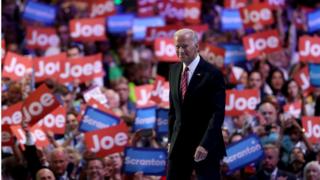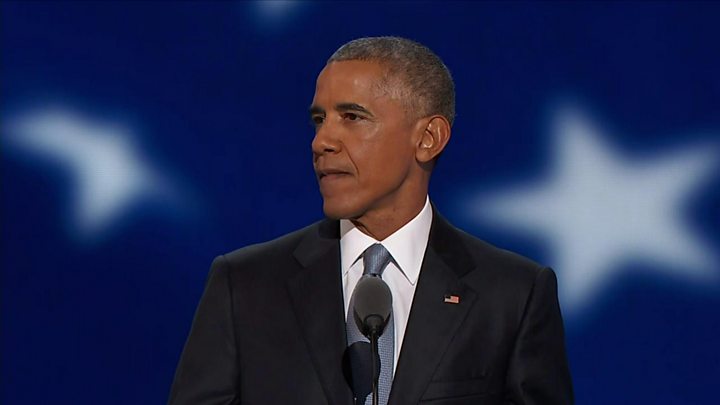Democratic National Convention: What to expect at Biden's nomination party
 Image copyright
Getty Images
Image copyright
Getty Images
Balloons. Confetti. Signs. Big hats. It's the moment many Americans - or at least those election enthusiasts among us - have been waiting four years for. It's convention season.
We'll kick things off next week with the Democratic National Convention, with four days of party events leading up to the main event: crowning the presidential nominee.
Of course this year, things are going to look a bit different.
Here's everything you need to know about this year's convention, Covid-19 changes and all.
What is the Democratic National Convention?
Remember seeing Hillary Clinton looking amazed at a downpour of blue balloons, or an onslaught of confetti greeting Barack Obama on stage? Those were the key moments of Democratic conventions past.
Essentially, this is where the Democratic Party comes together during a general election year to formally name - and hype up - their candidates.
You may be thinking, 'isn't Joe Biden already the nominee?'
Yes - and no. He's certainly the presumptive Democratic candidate, but things aren't party-official until they announce it at the convention.
Party members will also unveil the 2020 Democratic platform, the list of party values and policy priorities which they believe distinguish them from their rival Republicans.
OK, so where is the 2020 convention?
The short answer: In the Midwestern state of Wisconsin, at the Wisconsin Center in the city of Milwaukee.
The long answer: Milwaukee, but also nationwide.
Covid-19 restrictions and fears mean the 2020 convention will be held across the US, though planners say it will be "anchored" in Milwaukee. The convention will be streamed from the Democratic Party's social media channels and aired live on most US news channels.
Will Joe Biden be at the convention?
Planners say they've collected nearly 1,000 crowd-sourced videos to show off during the four convention nights, each of which will follow a theme centred around uniting America.
Those nightly themes, in order, are: We the people, leadership matters, a more perfect union, and America's promise. There will also be a number of segments aimed at properly introducing Biden to voters - and contrasting his vision with the "chaos" of the Trump presidency.
We won't see the sea of delegates and passionate party members anywhere this year, however. Officials say the "reimagined roll call process will take convention viewers to all 57 states and territories" in a 30-minute segment on Tuesday.
Don't expect to see Biden on stage either. The presumptive nominee will be dialling in from his home state of Delaware on Thursday night, although the exact location and format is still under wraps.
How long is the Democratic National Convention?
We've got four days of convention time to look forward to from 17-20 August.
But forget the traditional calendar with days full of speeches, receptions and rallies. This year, we'll get shortened primetime coverage from 21:00 to 23:00EDT each night.
What about Covid-19 measures?
Alright, time for the question on everyone's minds: how do you host an event like this in a pandemic?
In a word - remotely. Planners say the only people attending in-person will be those necessary to orchestrating the event. In any case, these numbers will be far, far fewer than the 50,000 attendees initially expected.
Earlier Covid-19 rules for convention-goers included wearing a mask, practicing social distancing and undergoing daily testing.
Who are the speakers this year?
The lack of balloons and big hats is disappointing to be sure, but there's still reason to tune in. There are a number of high profile speakers that might interest you.

Former President Barack Obama and his wife Michelle are both slated to speak this year, closing out Wednesday and Monday night respectively. Senator Bernie Sanders is also scheduled to address the virtual crowds on Monday night.
Former President Bill Clinton and Jill Biden will be the final two speeches on Tuesday, after remarks from several lawmakers, including Congresswoman Alexandria Ocasio-Cortez.
Hillary Clinton, former secretary of state and the 2016 nominee, will take a prime time slot on Wednesday night, as will Senator Elizabeth Warren.
Biden's vice-presidential pick Kamala Harris will also get a chance to address the nation with an acceptance speech on Wednesday.
Why is John Kasich speaking to Democrats?
It's rare, though not unprecedented, to have members of the other party show up.
Former Ohio Governor John Kasich, a Republican and Trump critic, is going to address the convention on Monday - he represents moderate conservatives unhappy with the direction the president has taken the Republican Party.
While you may not recognise some of the other names, local leaders who sparkle on screen could rise to become future party leaders - or presidents.
Think of Obama's 2004 speech - which is when the future president stood in the national spotlight for the first time.
Will it just be politicians speaking?
Not to worry - you'll hear from ordinary, relatable Americans too.
This sort of engagement with voters is typical convention fare, but this year, their voices will be aired on primetime television rather than mixed in with days of party events.
Planners have promised "fewer people behind podiums - and more people in living rooms, on factory floors, at small businesses, and in schools and town squares".
This line-up includes educators, gun safety advocates, healthcare workers and even some former Republicans.
We'll hear from a Pennsylvania farmer, Rick Telesz, who voted for Trump in 2016, but changed his mind after his family farm suffered amid the president's trade war. Another highlighted voice this year is gun safety advocate DeAndra Dycus, an Indiana mother whose 13-year-old son was shot and injured at a birthday party.
And it likely won't be just Democratic voters joining the e-party: expect appearances by celebrities. In 2016, we heard from actresses Meryl Streep and Lena Dunham, comedian Sarah Silverman and got a musical performance by Alicia Keys.
How is the candidate chosen?
If you've been following along with the primary election season so far, you know why the nomination vote is a formality for Biden. (If you need a refresher on all things primary and caucus, check out our explainer here.)
Delegates from across the nation will vote at the convention for the candidate that won their state's Democratic primary election or caucus.
They're not technically obligated to do so, but at least this year, the options are rather limited with only Biden still in the running.
As for those delegates who were promised to other candidates who've since withdrawn from the race, they're free to vote as they will.
This delegate system started in the 1970s - before that, nominees were selected solely by party members at the convention.
But who are the delegates?
So you want to know more about the nitty-gritty behind the delegate system? Let's break it down.
There are two kinds: state pledged delegates and superdelegates.
The former are, as the name implies, chosen at the state level to vote for a candidate at the national convention. Democratic state delegates - typically party activists or other local leaders - are allocated proportionally, based on how much of the state vote went to each candidate.
There are 3,979 Democratic delegates available during the primaries, and a candidate needs to win a majority of them - 1,991 - to become the nominee. Biden won over 2,600 during the primary process making him the de facto nominee.
As for the superdelegates? This time, there's no need to worry about these high-profile party grandees (think former presidents and Washington mainstays). Following criticism of the 2016 contest, these superdelegates won't cast their votes in the initial count.
What happens next?
Don't worry, convention season isn't over yet. We've got the Republican National Convention coming up from August 24-27 though the pandemic has upended President Trump's plans.
After that, presidential campaigning will be in full force until the general election on 3 November.
Make a note in your calendars for the debates too. The first presidential debate is scheduled for 29 September with two more in October.